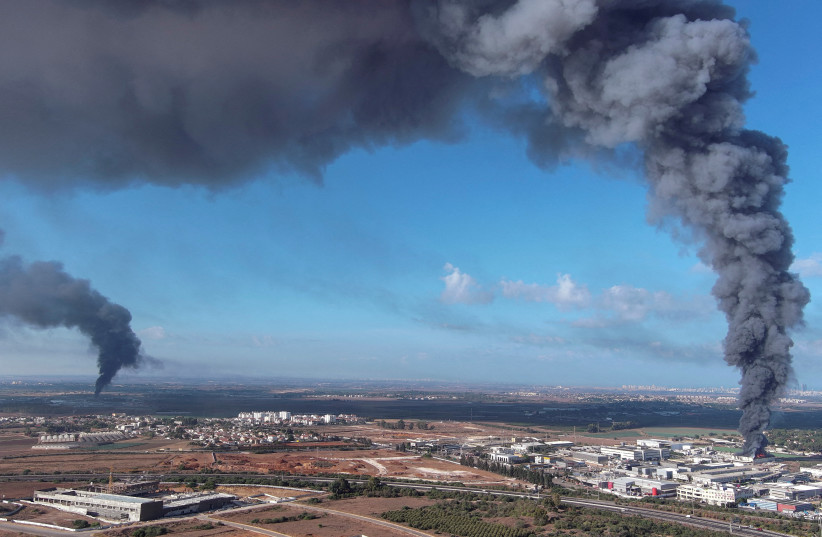I had forgotten to set my alarm.
That’s actually not quite true. As a gabbai (co-leader) of my Jerusalem synagogue, I have a weekly alarm set to get me out of bed in time for Shabbat morning services. This past weekend, however, Shabbat coincided with Simchat Torah – a holiday that celebrates the completion of one annual Torah-reading cycle and the start of another, and features a lengthy and festive prayer service – and we had announced that services would start half an hour earlier than usual. I neglected to adjust my alarm accordingly.
I was awakened by the faint but unmistakable sound of an air raid siren somewhere in the distance. I jumped out of bed and woke up my sister, who had come to spend the holiday with me.
We quickly shut the door to the garden to keep the cats indoors and went to the corner of my apartment farthest from the windows.
After a few minutes, I heard a knock at the door. A neighbor had come to inform us that the building’s bomb shelter was open.

I decided to turn my phone on, which I would never do under normal circumstances. Already then, reports were coming in of a security situation in southern Israel, but the exact nature of it was unclear.
After some deliberation, I decided to go to synagogue, taking my phone with me as a precaution.
We had expected dozens of people, including many young children, at our Simchat Torah service. When I got there, there was barely a minyan (a prayer quorum of 10 adults). I called over my fellow gabbaim and updated them on what was going on. We decided to shorten and accelerate the service to enable us to get out of there as quickly as possible.
I put on my tallit, picked up my siddur, and caught up. Every few minutes, I would walk into a side room and discreetly check my phone, exchanging information with The Jerusalem Post’s web team, which was keeping our website updated and our audience informed throughout.
It soon became clear that the person who was supposed to read the holiday Torah portion – the concluding verses of the Book of Deuteronomy – wasn’t going to show up, so I set about learning it myself.
Shortly after 11 a.m., we reported that several communities in southern Israel had been taken over by Hamas. It remained hard to believe. We had no idea how bad the situation actually was.
Every so often, we would hear an air raid siren and would halt the service abruptly, making our way down to the bomb shelter for several minutes before going back upstairs and resuming the service.
The last siren caught us just before the last part of the service, right after I forced my way through the Torah reading. We went down to the bomb shelter, wrapped up the proceedings in record time, and quickly left the building, making our way to our respective homes.
BY THE time we got home, the scope of the horror transpiring in southern Israel was becoming clear. Shabbat and Simchat Torah were canceled. Although we had been invited to close friends for a holiday lunch, we decided to stay home.
Around 1 p.m., the Post reported that 20 Israelis were dead and Prime Minister Benjamin Netanyahu had declared war.
Several Shabbat-observant Post staff members came online and joined the effort. Requests for television interviews about the situation started coming in from networks around the world, and I did them from my garden.
I worked throughout the afternoon and evening as the picture became clearer and the death toll mounted. At some point, I took a break to recite Kiddush over a shot of whiskey before returning to my phone and my computer.
The sun had set, and Shabbat and the holiday ended. I kept working through the night, overseeing our newsroom and doing one interview after another, before collapsing at around 3 a.m.
Saving lives through journalism as Israel goes to war
Pikuach nefesh is the principle in Judaism that dictates that saving a life is more important than pretty much anything else, including Shabbat and holidays. From the moment I realized what was going on, until the moment I went to sleep, I found myself wondering whether getting the news out during a war constitutes pikuach nefesh. Was I doing the right thing by suspending Shabbat – which I have observed my entire life – to keep the world informed?
I realized that, to me, the answer was yes.
On the most basic level, our website and app apprise users whenever there is a rocket attack, alerting residents and enabling them to seek cover even when they may not hear sirens in their area.
That’s pikuach nefesh in the purest sense.
It is also true that for many English speakers in Israel – immigrants, visiting students, gap year program participants, tourists, and others – our website is a vital source of potentially life-saving information, including Home Front Command directives and instructions, which change according to the situation. That, too, is obvious pikuach nefesh.
But more broadly, getting out the truth about the situation on the ground – the scope of the carnage, the devastation in the country’s South, a country in shock and in mourning – is essential to garnering international support for Israel to do what it must to eradicate the threat posed by Hamas.
That diplomatic backing won’t last (it never does), but for now it is essential. If there’s a chance that our reporting can help gain Israel the breathing room it needs to protect the Israeli people and save lives – well, that’s pikuach nefesh enough for me.
The writer is the editor-in-chief of The Jerusalem Post.
